
Head to Head: Budget ATA100, 7200 rpm Hard Drives
Posted By Van Smith
Date: August 13th, 2001
The fastest current IDE standard is ATA 100 which supports maximum theoretical transfer rates of 100 MB/s. To better take advantage of ATA100, drives have to spin faster than the old standard of 5400 revolutions per minute (rpm). The most common step up is 7200 rpm drives. Large capacity 7200 rpm, ATA100 drives are now inexpensive, and in this brief review we take a look at two 3.5 inch budget drives.
===================================
The Seagate Barracuda ATA III 30 GB Hard Drive
Our thrifty Seagate ST330620A 30 GB hard drive is a member of the venerable Barracuda line. We paid a mere $94 for this 7200 rpm drive at cnetpc.com, but this was for a bare drive (cable and mounting are extra). Seagate claims this drive has an average seek time of 8.5 ms. The ST330620A also has a 2MB buffer.
===================================
The Western Digital Caviar 40GB Hard Drive
Available at Sam's Club, we purchased a Western Digital WD400BB drive kit there for $129.98. Also featuring a 2MB buffer, Western Digital rates the drive's average seek time at 8.9 ms, slightly slower than the Seagate's (but that's not how they tested -- see below).
===================================
Benchmark Setup
We tested the two drives on a 1.4 GHz AMD Athlon system. The motherboard used was the Epox 8KHA which features the VIA KT266 chipset.
Both drives were set up with a 16,000 MB partition in an attempt to moderate capacity differences.
|
CPU |
1.4 GHz AMD Athlon (Thunderbird) |
|
Motherboard |
Epox 8KHA (BIOS 5/23/2001) |
|
Chipset |
VIA KT266, (4-in-1 driver: 4.32v) |
|
Graphics Card |
32MB ATi Radeon DDR (driver: 5.13.1.3211) |
|
Operating System |
Windows 2000, Service Pack 2 |
|
Memory |
1x 256 MB, PC2100, CL2 (Micron) |
===================================
HD Tach
The first benchmark results we will view are from HD Tach, the popular physical performance hard drive test. The first graph is from the Seagate, while the second is from the Western Digital.
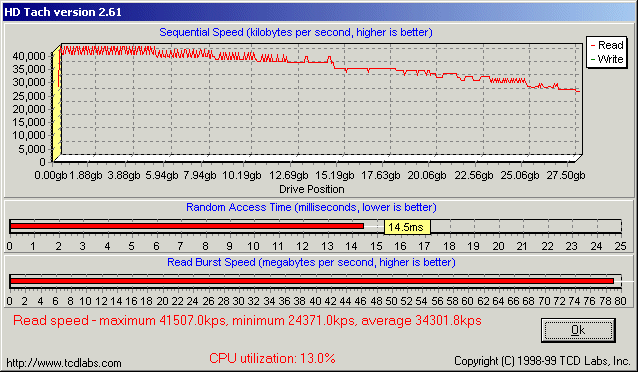
The Seagate ST330620A
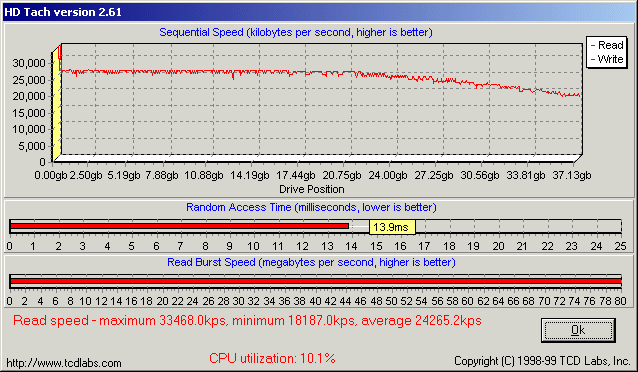
The Western Digital WD400BB
The HD Tach scores seem to indicate that the Seagate drive has far superior transfer rates with only slightly worse random access times, read burst speeds and CPU utilization rates. Taken alone this might suggest that the Seagate is the much better drive, but other tests will confuse the issue as we shall soon see.
===================================
Sandra
The next test up is SiSoftware's Sandra. Frankly, Sandra's File System Benchmark demonstrates extreme variability from run to run, so the usefulness of the overall score is questionable. With that said, the Seagate drive usually edged out the Western Digital in terms of Sandra's "Drive Index."
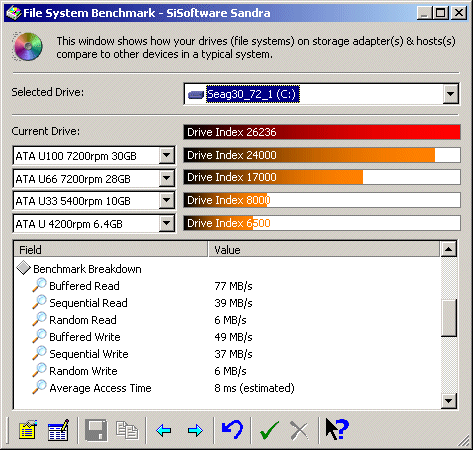
The Seagate ST330620A
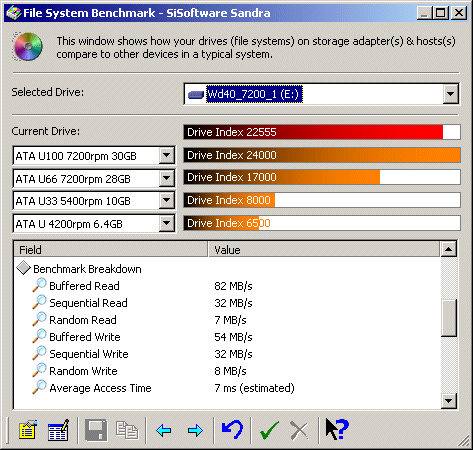
The Western Digital WD400BB
Again, although the Western Digital drive loses out overall, it does enjoy a lead in buffered operations as well as in lower access times. Random reads and writes also appear to be slightly faster for the WD400BB.
===================================
COSBI
We are in the process of organizing an open source benchmark project. Tentatively called "COSBI" for "Comprehensive Open Source Benchmarking Initiative," we will be reporting more on this effort soon.
A simple COSBI test under development creates a file of user definable size and measures the time this operation takes to complete. The test can also time how long it takes to copy this file. We created a 100 MB file and then ran the copy test. Rates for the two drives are shown in the graph below. Note that copy rates are an aggregate for reads and writes while create rates are pure writes.
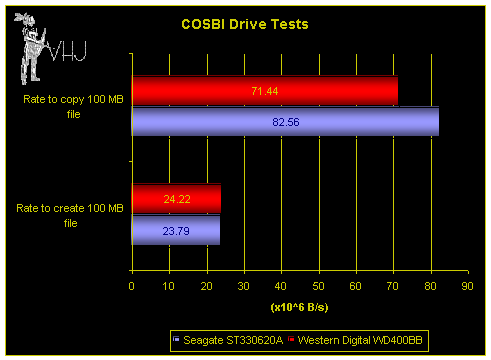
Although the Seagate drive copied the file faster, the Western Digital Drive was quicker creating the 100 MB file.
===================================
WinBench 99
The WinBench 99 disk transfer rates were similar to results obtained through HD Tach, although in the WinBench tests the Seagate drive fared slightly worse and the Western Digital drive looked a little better.
Jarringly different, however, the WinMark 99 disk tests show the Western Digital drive easily winning both tests. The WinMark tests simulate performance when executing popular applications. The extremely large margin of victory for the WD400BB in the "Business Disk" test is puzzling but repeatable.
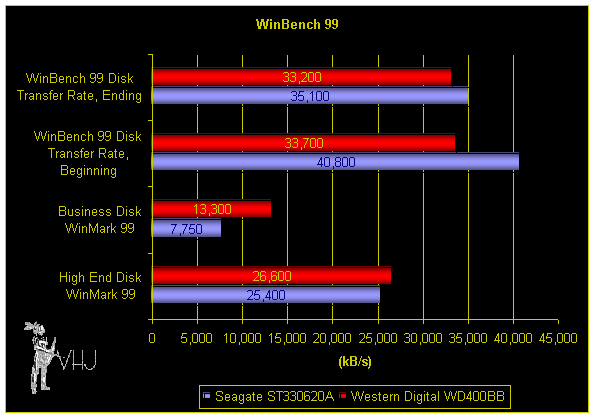
WinBench also confirmed again that the Western Digital drive has superior access times by a small margin. The WD400BB had an access time of 11 ms while the ST330620A had 11.9 ms access times.
===================================
Quality Issues
We had no problems with either drive although there are a couple of minor concerns dealing with the Western Digital product. The first concern is that the WD drive exposes electrical components on its underside, thus making it more susceptible to shorting in tight drive spaces. The Seagate drive has a protective case reducing this risk.
Even though the two drives have comparable electrical specifications, the WD400BB seems to run considerably warmer than the Seagate drive. This could be a problem in systems with tight thermal constraints.
===================================
Conclusion
While the Seagate drive dominated all tests in raw transfer rates, overall drive performance between these two budget hard drives is comparable. The Western Digital drive's better buffered performance together with slightly better access times may partially account for its wide margins of victory in the WinMark 99 tests of simulated application performance.
Both drives are thrifty. When considering that the $130 Western Digital drive is 33% larger and also came in a retail kit that includes cable, mounting hardware and bundled software, it may be a slightly better value. If you do purchase the bare $94 Seagate drive, make sure you also have an 80-conductor, 40-pin IDE cable necessary for ATA100 (and ATA66) drives.
Two knocks against the WD400BB are the exposed electronics on its belly that make it more susceptible to shorting and the fact that the drive runs somewhat hotter than the Seagate. If neither of these minor quibbles are important to you than both drives are similarly attractive.
===================================
Pssst! Our Donation Page is up.
===================================